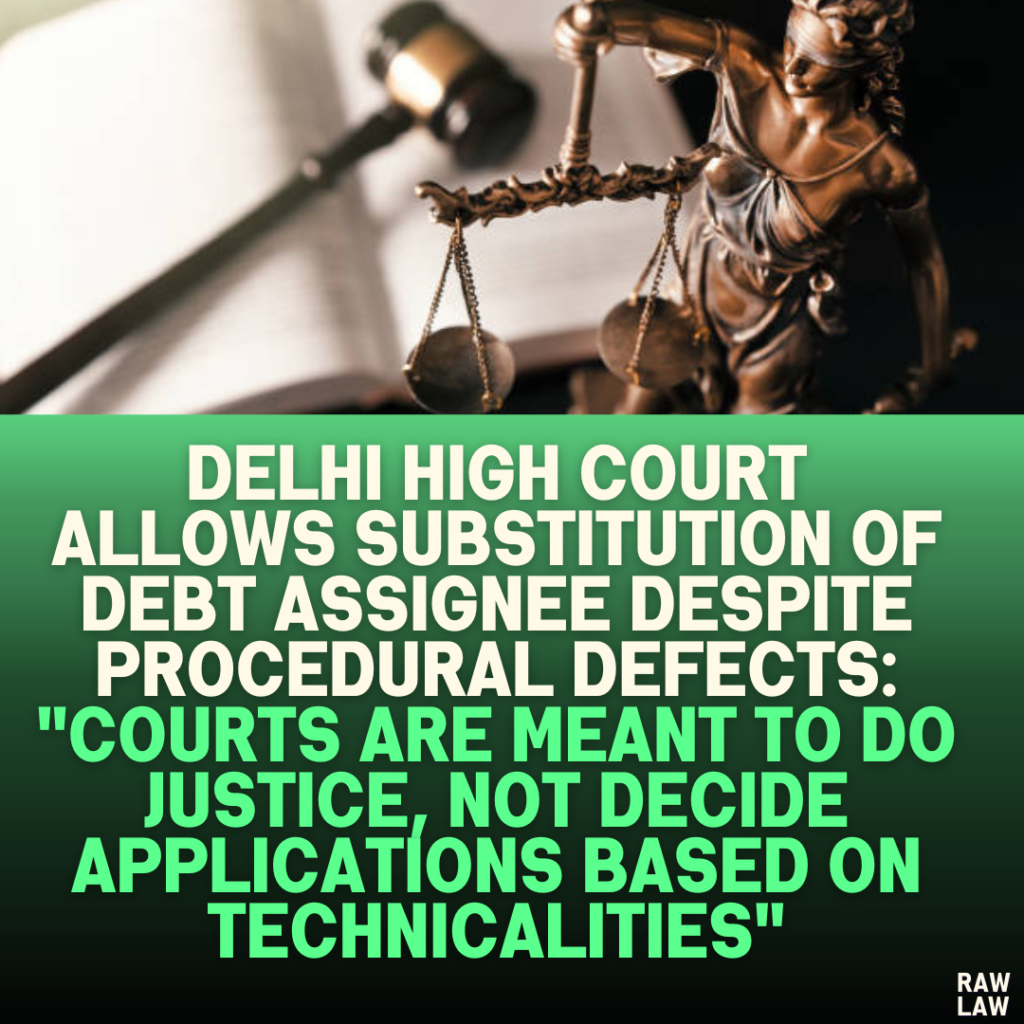Court’s Decision
The Delhi High Court ruled in favor of substituting VSJ Investments Pvt. Ltd. in place of Exclusive Capital Ltd. as Defendant No. 9. The substitution was requested after a loan default led to the assignment of debt rights by Clover Media Pvt. Ltd. (the lender) to VSJ Investments. Despite the procedural defect in filing the substitution application under the wrong provision of the Civil Procedure Code (CPC), the court corrected this and emphasized justice over technicalities, stating:
“Courts are meant to do justice and not to decide applications based on technicalities.”
The substitution ensures the proper continuation of the proceedings while allowing VSJ Investments to assert its rights under the legally valid agreements.
Facts of the Case
- Loan Agreement:
- Clover Media Pvt. Ltd. extended a loan of ₹60 crores to Exclusive Capital Ltd. under an Inter Corporate Loan (ICL) Agreement dated December 14, 2022.
- The agreement stipulated that the loan would be repaid using proceeds from a debt owed to Exclusive Capital Ltd. by Asian Hotels North Ltd. (referred to as the AHNL debt).
- Default by Borrower:
- Exclusive Capital Ltd. defaulted on its repayment obligations under the ICL Agreement.
- Assignment of Debt:
- To recover its dues, Clover Media assigned the loan rights, including the AHNL debt, to VSJ Investments Pvt. Ltd. via a Registered Assignment Agreement dated February 2, 2024.
- Substitution Application:
- VSJ Investments, as the new assignee of the AHNL debt, sought to substitute Exclusive Capital Ltd. in the ongoing commercial suit to enforce its rights to receivables from the AHNL debt.
Issues Identified
- Procedural Validity:
- Can an application filed under Order 1 Rule 10 CPC for impleadment of parties be treated as one under Order 22 Rule 10 CPC for substitution?
- Validity of Loan and Assignment Agreements:
- Were the ICL Agreement and the subsequent Registered Assignment Agreement valid and enforceable?
- Entitlement to Substitution:
- Could VSJ Investments be substituted as Defendant No. 9, replacing Exclusive Capital Ltd.?
- Claims of Fraud and Unauthorized Transactions:
- Were the allegations of fraud and collusion raised by the respondent credible?
Petitioner’s (VSJ Investments Pvt. Ltd.) Arguments
- Legal Validity:
- The ICL Agreement expressly allowed debt assignment to third parties, empowering Clover Media to assign its rights to VSJ Investments (as per Clauses 3.3 and 17.4).
- The assignment was executed through a Registered Assignment Agreement, granting it statutory validity.
- Evidence Supporting Validity:
- Email communications between Exclusive Capital and Clover Media demonstrated acknowledgment of the AHNL debt and the transfer of rights.
- Justice Over Technicalities:
- Procedural lapses (filing under the wrong CPC provision) should not obstruct justice. The application should be treated substantively under Order 22 Rule 10 CPC, allowing substitution.
Respondent’s (Exclusive Capital Ltd.) Arguments
- Fraud Allegations:
- The ICL Agreement was fraudulent, collusive, and unauthorized, involving a former employee of Exclusive Capital who lacked authority to execute the agreement.
- Unsecured Nature of the Loan:
- The AHNL debt was not secured under the ICL Agreement, rendering the assignment invalid.
- Procedural Defects:
- The substitution application was filed under Order 1 Rule 10 CPC, which does not apply to substitutions, making it procedurally defective.
- Limit on Recoverable Amount:
- VSJ Investments could only claim ₹60 crores (loan principal), not the full AHNL debt, which was approximately ₹126 crores.
Court’s Analysis
1. Procedural Validity
- The court emphasized that the application’s substance, not its labeling, determines its treatment. It relied on precedents to hold that an application filed under Order 1 Rule 10 CPC could be treated under Order 22 Rule 10 CPC, as the essence of the prayer was substitution due to devolution of interest.
- The court stated that procedural defects should not obstruct substantive justice.
2. Validity of Agreements
- ICL Agreement:
- Clauses 3.3 and 17.4 expressly allowed Clover Media to assign its rights to a third party, confirming its legal enforceability.
- Evidence, including email communications and documentation, supported the existence and validity of the agreement.
- Assignment Agreement:
- The Registered Assignment Agreement met legal requirements and was never challenged in court, making it presumptively valid.
3. Respondent’s Fraud Allegations
- The court found the fraud claims unsubstantiated, as the respondent failed to provide evidence or pursue investigative findings regarding alleged collusion or forgery.
- Even if fraud were proven, it would fall under criminal proceedings, unrelated to the present commercial suit.
4. Recoverable Amount
- The court rejected the respondent’s argument for capping recoverable dues at ₹60 crores. It observed that the ICL Agreement did not impose such a limitation and that the AHNL debt transfer was lawfully executed.
5. Judicial Precedents
- The court relied on rulings such as Jagannath Mahaprabhu v. Pravat Chandra Chatterjee and Pankajbhai Rameshbhai Zalavadiya v. Jethabhai Kalabhai Zalavadiya, which stress that procedural lapses should not obstruct justice and that courts should prioritize substantive justice over technical formalities.
Conclusion
- The substitution application was allowed, treating it as filed under Order 22 Rule 10 CPC.
- VSJ Investments Pvt. Ltd. was substituted in place of Exclusive Capital Ltd. as Defendant No. 9.
- The court directed the petitioner to file an amended memo of parties within a week.
Implications
- Justice Over Technicalities:
- The judgment reinforces that courts prioritize substantive justice over procedural errors, ensuring fair outcomes in disputes involving financial agreements.
- Clarity on Debt Assignments:
- The ruling confirms the enforceability of debt assignments executed under valid agreements, providing confidence to financial institutions and lenders.
- Procedural Flexibility:
- Courts have the discretion to address procedural missteps, emphasizing justice and effective dispute resolution.
- Commercial Disputes:
- This case highlights the importance of proper documentation and adherence to contractual terms in financial transactions.




Delhi High Court Allows Substitution of Debt Assignee Despite Procedural Defects: “Courts Are Meant to Do Justice, Not Decide Applications Based on Technicalities” – Raw Law
aspnbcwdps
[url=http://www.glt7jk0141z7a9zh5xezct814tr26155s.org/]uspnbcwdps[/url]
spnbcwdps http://www.glt7jk0141z7a9zh5xezct814tr26155s.org/